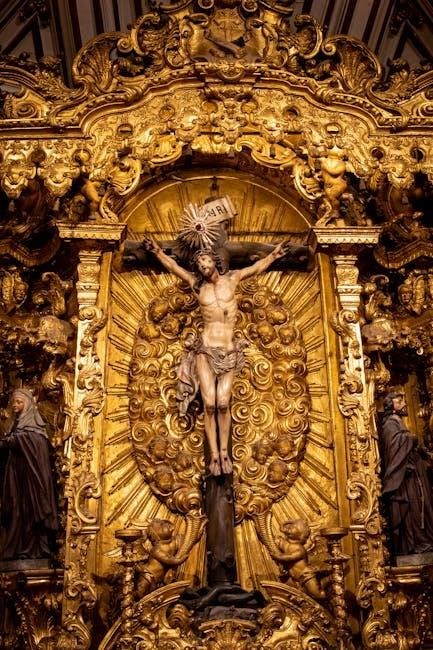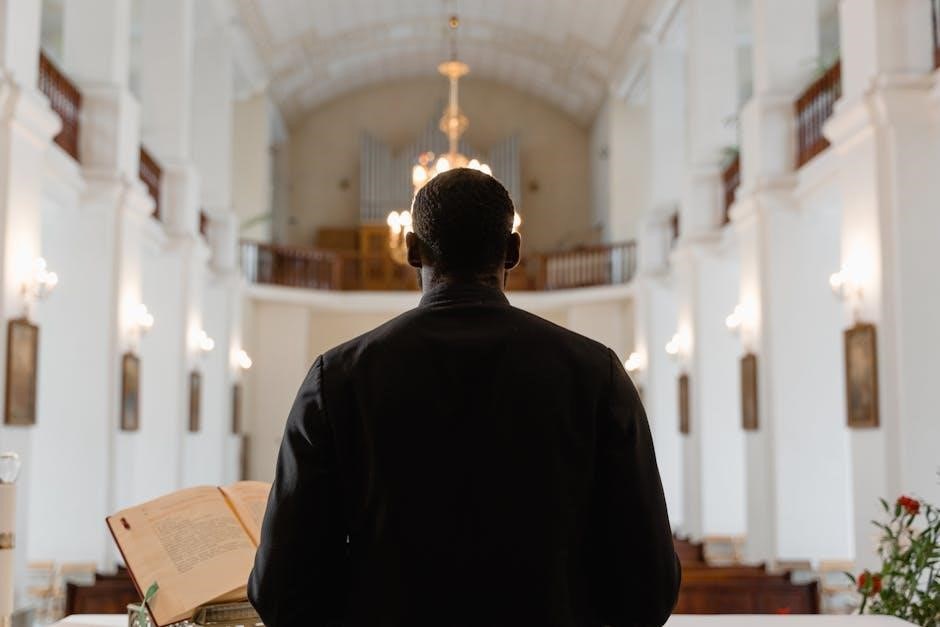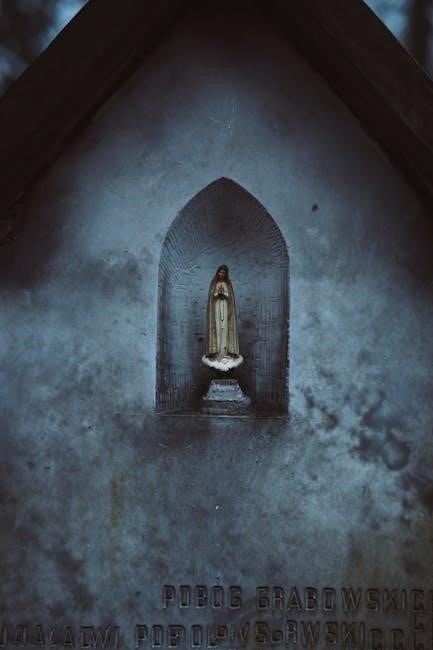
catholic catechism questions and answers pdf
The Catholic Catechism is a foundational resource offering questions and answers about Catholic faith‚ doctrine‚ and practices‚ providing clarity and guidance for believers of all ages․
What is the Catholic Catechism?
The Catholic Catechism is a comprehensive resource that presents the teachings of the Catholic Church in a clear and organized manner․ It is structured as a series of questions and answers‚ making it accessible to people of all ages and backgrounds․ The Catechism serves as a guide for understanding the Catholic faith‚ covering topics such as the nature of God‚ the sacraments‚ moral teachings‚ and the Church’s role in the world․ It is divided into four main sections: the Profession of Faith‚ the Celebration of the Christian Mystery‚ Life in Christ‚ and Christian Prayer․ This format allows believers to deepen their understanding of Catholic doctrine and apply it to their daily lives․ The Catechism is widely used in education and personal reflection‚ making it an essential tool for faith formation․
The Purpose of the Catechism
The primary purpose of the Catholic Catechism is to provide a clear and accessible explanation of the Catholic Church’s teachings․ It serves as both an educational tool and a reference for deepening one’s spiritual life․ The Catechism is designed to help individuals understand and live according to their faith‚ offering a structured question-and-answer format that facilitates easy comprehension․ It is widely used in religious education programs to standardize the teachings‚ ensuring consistency across different communities․ Additionally‚ it acts as a reference for Catholics to clarify doubts or questions about their faith‚ making it useful for both new believers and lifelong Catholics seeking to reaffirm their beliefs․ The Catechism also supports personal reflection‚ small group discussions‚ and spiritual growth‚ making it an essential resource for applying Catholic teachings in daily life․

Structure of the Catechism
The Catholic Catechism is organized into four main sections‚ each addressing a fundamental aspect of Catholic faith․ The first part focuses on the Creed‚ exploring beliefs about God‚ Creation‚ and humanity․ The second part delves into the Sacraments‚ detailing their significance and role in spiritual life․ The third part discusses the Commandments‚ outlining moral principles and ethical guidelines․ The fourth part is dedicated to Prayer‚ examining its importance and various forms․ This structured approach ensures comprehensive coverage of Catholic doctrine‚ making it accessible for both education and personal reflection․ The clear division allows readers to navigate easily‚ fostering a deeper understanding of Catholic teachings and practices․

Questions and Answers on the Catholic Faith
Questions and Answers on the Catholic Faith provides a comprehensive overview of Catholic teachings‚ covering the Creed‚ Sacraments‚ Commandments‚ and Prayer‚ offering clarity and depth for all believers․

Common Questions About God and Creation
Common questions about God and creation often focus on the nature of divine existence‚ the origin of the universe‚ and humanity’s role within it․ Many inquire about the relationship between God and humanity‚ asking why God created the world and what humanity’s purpose is․ Others seek clarity on the concept of sin and its impact on creation․ Additionally‚ questions arise about the Holy Trinity and how the three Persons of God interact in the act of creation․ The Catechism addresses these inquiries by emphasizing that God created the world out of love and that humanity is called to steward creation responsibly․ These teachings provide a foundational understanding of Catholic beliefs about God and the world․

Questions Regarding the Life of Jesus Christ
Questions about the life of Jesus Christ often center on His divine mission‚ teachings‚ and redemptive work․ Many ask about the significance of His birth‚ baptism‚ and miracles‚ seeking to understand their theological importance․ Others inquire about the meaning of His parables and how they relate to Christian living․ The Catechism explains that Jesus’ life reveals God’s love and plan for humanity‚ emphasizing His death and resurrection as the ultimate act of salvation․ It also highlights His role as both fully human and fully divine‚ bridging the gap between God and humanity․ These questions and answers deepen faith and provide a clearer understanding of Jesus’ role in Catholic teachings․
Understanding the Sacraments
The sacraments are sacred signs instituted by Christ to give grace and strengthen the faith of believers․ The Catholic Church recognizes seven sacraments‚ each serving a unique purpose in the spiritual life of Catholics․ These include Baptism‚ Confirmation‚ the Eucharist‚ Penance‚ Anointing of the Sick‚ Holy Orders‚ and Matrimony․ The Catechism explains that sacraments are outward signs of inward grace‚ visibly expressing God’s love and mercy․ They mark important milestones in a Catholic’s journey‚ from birth to death‚ and deepen one’s relationship with God․ Understanding the sacraments helps Catholics appreciate their role in receiving divine grace and living a life rooted in faith and devotion․
Moral Teachings of the Catholic Church
The Catholic Church’s moral teachings emphasize living a virtuous life guided by divine law and the principles of the Gospel․ Central to these teachings is the dignity of the human person‚ created in God’s image‚ and the call to love God and neighbor․ The Church teaches that moral decisions must align with natural law‚ which is inscribed in human hearts and reflects God’s will․ Key moral virtues include prudence‚ justice‚ fortitude‚ and temperance‚ while theological virtues—faith‚ hope‚ and charity—guide Catholics toward holiness․ The Church also stresses the importance of caring for the poor‚ upholding life’s sanctity‚ and fostering justice in society․ These moral teachings aim to help Catholics grow in holiness and live as disciples of Christ․

The Role of the Catechism in Catholic Education
The Catechism serves as a foundation for Catholic faith education‚ providing a structured approach to understanding doctrine‚ morals‚ and worship․ It shapes beliefs and guides spiritual growth‚ offering practical wisdom for daily life as a resource for both individuals and educators․
Teaching the Catechism to Children
Teaching the Catechism to children is essential for their spiritual development‚ providing a clear understanding of Catholic beliefs and values․ The Catechism is structured to engage young minds through simple language and relatable concepts․ Parents and educators use its question-and-answer format to explain complex doctrines‚ making faith accessible․ Bible stories‚ prayers‚ and moral teachings are emphasized to foster a deep connection with God․ Age-appropriate activities and discussions help children internalize the faith․ The Catechism also encourages children to live virtuous lives‚ preparing them for sacraments like First Communion and Confirmation․ By teaching the Catechism‚ adults guide children in developing a lifelong commitment to their faith‚ ensuring its transmission to future generations․
The Catechism as a Tool for Adult Faith Formation
The Catechism serves as a vital resource for adult faith formation‚ offering in-depth exploration of Catholic teachings; Its structured format‚ with clear questions and answers‚ makes it accessible for adults seeking to deepen their understanding of the faith․ The Catechism addresses complex theological concepts‚ moral issues‚ and spiritual practices‚ encouraging adults to reflect on their beliefs and live them authentically․ It is often used in RCIA programs‚ Bible studies‚ and retreats to foster spiritual growth․ Adults appreciate its comprehensive nature‚ which provides a foundation for prayer‚ sacramental life‚ and service․ By studying the Catechism‚ adults can enrich their faith journey‚ gaining clarity and confidence in sharing their beliefs with others․
Using the Catechism in Parish Ministries
The Catechism is a valuable resource for parish ministries‚ providing a unified and authoritative guide for teaching the Catholic faith․ It is widely used in adult education programs‚ RCIA‚ and youth ministries to ensure consistency in faith formation․ Parish priests and catechists rely on its clear questions and answers to prepare homilies‚ lead Bible studies‚ and facilitate faith-sharing groups․ The Catechism also supports the development of small faith communities by offering a shared reference for prayer and reflection․ Its accessibility makes it an ideal tool for outreach and evangelization efforts‚ helping to deepen parishioners’ understanding of Catholic doctrine and practices․ By integrating the Catechism into parish life‚ ministries can foster a more informed and engaged faith community․

Popular Questions from the Catechism
The Catechism addresses fundamental questions about God‚ the Holy Trinity‚ prayer‚ and the Church’s authority․ These topics are often explored in Catholic catechism questions and answers PDF resources․
Questions About the Holy Trinity
The Holy Trinity is a central mystery of the Catholic faith‚ often explored in Catholic catechism questions and answers PDF resources․ Common questions include: “How can God be one and yet three distinct persons?” and “What is the role of each person in the Trinity?” The Catechism explains that the Trinity is one God in three divine persons—Father‚ Son‚ and Holy Spirit—distinct yet inseparable․ It emphasizes that the Trinity is a mystery beyond full human understanding but revealed through Scripture and Tradition․ These questions highlight the Trinity’s importance in Catholic theology and worship‚ providing a deeper understanding of God’s nature and relationship with humanity․ The Catechism addresses these queries in sections like 237-258‚ offering clarity and reinforcing the Trinity’s centrality in Christian belief․
Questions on Prayer and Worship
Questions on prayer and worship are essential in Catholic catechism resources‚ as they guide believers in deepening their faith․ Common inquiries include: “What is the purpose of prayer?” and “How should one worship God?” The Catechism explains that prayer is a vital conversation with God‚ fostering a personal relationship with Him․ Worship‚ particularly through the sacraments and liturgy‚ is an expression of reverence and adoration for God’s majesty․ Questions also address different types of prayer‚ such as adoration‚ thanksgiving‚ petition‚ and penance․ The Catechism emphasizes the importance of prayer in aligning one’s will with God’s plan and finding spiritual strength․ These questions and answers provide practical guidance for living a prayerful and worshipful life‚ reinforcing the Catholic Church’s teachings on prayer as a cornerstone of Christian living․

Questions About the Church and Its Authority
Questions about the Church and its authority often focus on its divine origin and role in guiding believers․ Common inquiries include: “Why does the Church have authority?” and “What is the Pope’s role?” The Catechism explains that the Church‚ founded by Christ‚ is guided by the Holy Spirit‚ ensuring its teachings align with God’s will․ The Pope‚ as the successor of St․ Peter‚ holds a central role in maintaining unity and doctrine․ Questions also explore the concept of infallibility and the hierarchy of the Church․ The Catechism emphasizes the Church’s authority as a gift to safeguard the faith and lead people to salvation․ These questions and answers highlight the Church’s essential role in interpreting Scripture and tradition‚ providing a foundation for Catholic belief and practice․

Key Concepts in the Catechism
The Catechism emphasizes the Holy Trinity‚ Sacraments‚ and moral law as central to Catholic faith․ These teachings guide believers in understanding God’s plan and living virtuously․
The Commandments and Moral Law
The Catholic Catechism emphasizes the Ten Commandments as a foundational guide for moral living․ These commandments‚ revealed by God‚ outline the principles for loving God and neighbor․ They serve as a framework for understanding right and wrong‚ fostering a life of virtue and holiness․ The Catechism teaches that moral law is rooted in divine wisdom and is essential for achieving eternal salvation․ By following the commandments‚ believers honor God’s will and cultivate a deeper relationship with Him․ The Catechism also connects the commandments to Jesus’ teachings‚ particularly the Great Commandment to love God and neighbor․ This moral framework is not only a set of rules but a path to freedom and fulfillment‚ guiding Catholics to live according to God’s plan․
The Sacraments of Initiation
The Sacraments of Initiation are the foundation of the Christian life in the Catholic Church․ They include Baptism‚ Confirmation‚ and the Eucharist․ Baptism cleanses the soul from original sin‚ making one a child of God․ Confirmation strengthens the person with the Holy Spirit‚ deepening their faith․ The Eucharist‚ the source and summit of Christian life‚ unites the faithful with Christ through Holy Communion․ These sacraments are essential for full initiation into the Church‚ enabling believers to live a life of grace and participate actively in the liturgy․ They are a divine gift‚ fostering spiritual growth and eternal salvation․
The Sacraments of Healing
The Sacraments of Healing are Penance and Reconciliation (Confession) and the Anointing of the Sick․ These sacraments restore and strengthen the spiritual and physical well-being of the faithful․ Penance offers forgiveness for sins committed after Baptism‚ reconciling the individual with God and the Church․ The Anointing of the Sick provides spiritual and physical healing‚ preparing the soul for eternal life‚ especially in times of serious illness or old age․ Both sacraments emphasize God’s mercy‚ grace‚ and love‚ offering hope and renewal to believers․ They are vital for maintaining a healthy spiritual life and deepening one’s relationship with Christ․
The Sacraments at the Service of Communion
The Sacraments at the Service of Communion are Holy Orders and Matrimony․ These sacraments are directed toward the salvation of others and the building up of the Church․ Holy Orders consecrate men to the priesthood or diaconate‚ enabling them to serve the community through preaching‚ teaching‚ and administering the sacraments․ Matrimony unites a man and woman in a lifelong covenant‚ reflecting God’s love and commitment to humanity․ Both sacraments emphasize vocational living‚ dedication‚ and selfless service․ They strengthen the Church’s mission and foster unity among its members․ Through these sacraments‚ individuals are called to live out their faith in a way that supports and enriches the entire Catholic community․

Practical Applications of the Catechism
The Catechism provides guidance for daily decisions‚ helping Catholics apply its teachings to real-world scenarios‚ fostering a deeper connection with faith in everyday life and challenges․
How to Use the Catechism for Daily Life
The Catechism serves as a practical guide for integrating faith into daily life․ By studying its teachings‚ Catholics can navigate moral dilemmas‚ strengthen relationships‚ and deepen their spiritual practices․
It offers insights into prayer‚ virtue cultivation‚ and sacramental life‚ helping individuals apply Catholic doctrine to everyday challenges․ Regular reflection on its content fosters a consistent faith life‚ guiding decisions and actions according to Church teachings․ This resource is invaluable for personal growth and living out one’s faith intentionally in all aspects of life․
Applying Catechism Teachings in Family Life
The Catechism provides a foundation for fostering faith within families․ Parents can use its teachings to guide children in prayer‚ morality‚ and sacramental participation․
It emphasizes the importance of family as a “domestic church‚” where love‚ forgiveness‚ and virtue are nurtured․ By integrating Catechism principles‚ families can create a faith-centered home environment․
Teachings on marriage‚ parenting‚ and family values offer practical guidance for resolving conflicts and making decisions rooted in Catholic doctrine․ This application strengthens family bonds and helps raise children with a strong moral and spiritual framework․
The Catechism and Social Justice
The Catechism emphasizes the Church’s commitment to social justice‚ rooted in the dignity of every human person․ It teaches that all individuals are created in God’s image and deserve respect‚ fairness‚ and compassion․
The principles of the common good‚ solidarity‚ and subsidiarity guide Catholics in addressing societal issues like poverty‚ inequality‚ and human rights․
The Catechism calls believers to care for the vulnerable‚ uphold moral standards in public life‚ and work toward a just and peaceful society․ By living these teachings‚ Catholics contribute to the transformation of the world according to God’s plan․ Social justice is not just a moral obligation but a vital expression of Christian love and discipleship․
The Catholic Catechism serves as a vital guide for deepening faith and understanding Church teachings‚ offering timeless wisdom for spiritual growth and discipleship in today’s world․
The Importance of the Catechism in Today’s World
The Catholic Catechism remains a cornerstone of faith‚ offering clear teachings that guide believers in understanding God’s plan and living virtuously․ In a world filled with uncertainty‚ it provides a steadfast foundation for spiritual growth and moral clarity․ The Catechism’s timeless truths address modern challenges‚ helping individuals navigate complex ethical issues and deepen their relationship with Christ․ Its universal appeal fosters unity among Catholics worldwide‚ transcending cultural and generational divides․ By emphasizing the dignity of every person and the call to love‚ the Catechism inspires followers to contribute to a more just and compassionate society․ It continues to be an indispensable resource for those seeking to live their faith authentically in today’s ever-changing world․
Final Thoughts on the Catechism
The Catholic Catechism stands as a timeless treasure of faith‚ guiding believers in understanding and living the teachings of Christ․ It serves as a lifelong companion for spiritual growth‚ helping individuals deepen their relationship with God and the Church․ In a world filled with questions‚ the Catechism provides answers rooted in divine truth‚ offering clarity and direction․ Its comprehensive nature ensures that it is accessible to people of all ages and backgrounds‚ making it an invaluable resource for both personal reflection and communal faith formation․ Ultimately‚ the Catechism reminds us of our call to holiness and our mission to share the Gospel with love and joy․ Its enduring relevance continues to inspire and transform lives‚ fostering a deeper connection to the heart of Catholicism․